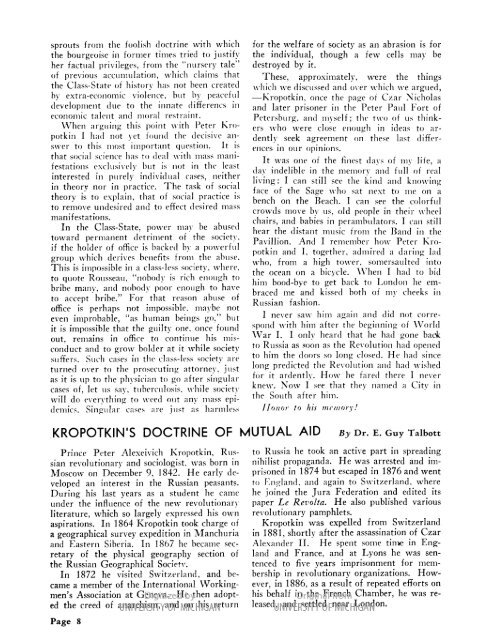Centennial Expressions on Peter Kropotkin 1842-1942.
Centennial Expressions on Peter Kropotkin 1842-1942.
Centennial Expressions on Peter Kropotkin 1842-1942.
You also want an ePaper? Increase the reach of your titles
YUMPU automatically turns print PDFs into web optimized ePapers that Google loves.
sprouts from the foolish doctrine with which<br />
the bourgeoise in former times tried to justify<br />
her factual privileges, from the "nursery tale"<br />
of previous accumulati<strong>on</strong>, which claims that<br />
the Class-State of history has not been created<br />
by extra-ec<strong>on</strong>omic violence, but by peaceful<br />
development due to the innate differencs in<br />
ec<strong>on</strong>omic talent and moral restraint.<br />
When arguing this point with <strong>Peter</strong> <strong>Kropotkin</strong> I had not yet found the decisive alnswer to this most important questi<strong>on</strong>. It is<br />
that social science has to deal with mass manifestati<strong>on</strong>s exclusively but is not in the least<br />
interested in purely individual cases, neither<br />
in theory nor in practice. The task of social<br />
theory is to explain, that of social practice is<br />
to remove undesired and to effect desired mass<br />
manifestati<strong>on</strong>s.<br />
In the Class-State, power may be abused<br />
toward permanent detriment of the society,<br />
if the holder of office is backed by a powerfull<br />
group which derives benefits from the abuse.<br />
This is impossible in a class-less society, where.<br />
to quote Rousseau, "nobody is rich enough to<br />
bribe many, and nobody poor enough to have<br />
to accept bribe." For that reas<strong>on</strong> abuse of<br />
office is perhaps not impossible, maybe not<br />
even improbable, "as human beings go," but<br />
it is impossible that the guilty <strong>on</strong>e, <strong>on</strong>ce found<br />
out, remains in office to c<strong>on</strong>tinue his misc<strong>on</strong>duct and to grow bolder at it while society<br />
suffers. Such cases in the class-less society are<br />
turned over to the prosecuting attorney, just<br />
as it is up to the physician to go after singular<br />
cases of, let us say, tuberculosis, while society<br />
will do everything to weed out any mass epidemics. Singular cases are just as harmless<br />
for the welfare of society as an abrasi<strong>on</strong> is for<br />
the individual, though a few cells may be<br />
destroyed by it.<br />
These, approximately, wxere the things<br />
which we discussed and over which we argued,<br />
-<strong>Kropotkin</strong>, <strong>on</strong>ce the page of Czar Nicholas<br />
and later pris<strong>on</strong>er in the <strong>Peter</strong> Paul Fort of<br />
<strong>Peter</strong>sburg, and myself; the two of us thinkers who were close enough in ideas to ardently seek agreement <strong>on</strong> these last differences in our opini<strong>on</strong>s.<br />
It was <strong>on</strong>e of the finest days of my life, a<br />
day indelible in the memory and full of real<br />
living: I can still see the kind and knowing<br />
face of the Sage who sat next to me <strong>on</strong> a<br />
bench <strong>on</strong> the Beach. I can see the colorful<br />
crowds move by us, old people in their wheel<br />
chairs, and babies in perambulators. I can still<br />
hear the distant music from the Band in the<br />
Pavilli<strong>on</strong>. And I remember how <strong>Peter</strong> <strong>Kropotkin</strong> and I, together, admired a daring lad<br />
who, from a high tower, somersaulted into<br />
the ocean <strong>on</strong> a bicycle. When I had to bid<br />
him bood-bye to get back to L<strong>on</strong>d<strong>on</strong> he embraced me and kissed both of my cheeks in<br />
Russian fashi<strong>on</strong>.<br />
I never saw him again and did not corresp<strong>on</strong>d with him after the beginning of World<br />
War I. I <strong>on</strong>ly heard that he had g<strong>on</strong>e back<br />
to Russia as so<strong>on</strong> as the Revoluti<strong>on</strong> had opened<br />
to him the doors so l<strong>on</strong>g closed. He had since<br />
l<strong>on</strong>g predicted the Revoluti<strong>on</strong> and had wished<br />
for it ardently. How he fared there I never<br />
knew. Now I see that they named a City in<br />
the South after him.<br />
I<strong>on</strong>or to his nmemCory!<br />
KROPOTKIN'S DOCTRINE OF MUTUAL AID<br />
By Dr. E. Guy Talbott<br />
Prince <strong>Peter</strong> Alexeivich <strong>Kropotkin</strong>, Russian revoluti<strong>on</strong>ary and sociologist, was born in<br />
Moscow <strong>on</strong> December 9, <strong>1842</strong>. He early developed an interest in the Russian peasants.<br />
During his last years as a student he came<br />
under the influence of the new revoluti<strong>on</strong>ary<br />
literature, which so largely expressed his own<br />
aspirati<strong>on</strong>s. In 1864 <strong>Kropotkin</strong> took charge of<br />
a geographical survey expediti<strong>on</strong> in Manchuria














![The Philosophy of Progress [pdf]](https://img.yumpu.com/14077359/1/190x245/the-philosophy-of-progress-pdf.jpg?quality=85)

